
October is Breast Cancer Awareness Month. Breast cancer is the second most common cancer in American women after skin cancer. The National Cancer Institute estimates that there will be about 310,000 new cases of breast cancer in women in the United States in 2024, as well as about 2,800 new cases in men.
Common symptoms of breast cancer include:
● A new lump in breast or armpit
● Irritation or dimpling of breast skin
● Red and/or flaky skin in the nipple area
● Any change in size or shape of the breast
If you have any of the symptoms above or other abnormal changes in your breast shape or function, it is important to promptly speak with a healthcare professional about them.
People at high risk for breast cancer should be screened for it earlier and more frequently, while people at an average risk for breast cancer have the option to start screening with a mammogram every year starting at age 40.
Types of breast cancer screening include:
● Mammograms
● Ultrasounds
● MRI scans
In addition to screenings done by healthcare professionals, conducting regular self-exams on your breasts can help detect symptoms early. The American Cancer Society states that catching breast cancer early can increase the chances of successful treatment.
Support Breast Cancer Awareness Month by encouraging people to get screened and to conduct their own self-exams, supporting your loved ones with breast cancer, and by sharing your own experiences.
Check out some of our books from the library collection below to learn more about breast cancer and for resources after a recent diagnosis:
The Breast Cancer Survival Manual, Sixth Edition: A Step-by-Step Guide for Women with Newly Diagnosed Breast Cancer by John Link M.D., James Waisman M.D., Nancy Link R.N., Shlomit Ein-Gal M.D.
One of the most comprehensive and bestselling books on breast cancer treatment and survival, completely revised and updated
The sixth edition of Breast Cancer Survival Manual provides essential updates on treatment and care, enhancing the basic information that has made this the most trusted guide for women diagnosed with breast cancer for the past two decades. This edition includes the most current advice on:
· The new genomic classification of breast cancer and its importance in treatment planning
· Cancer gene testing, which determines if a woman will benefit from chemotherapy
· New developments in breast cancer treatments with new targeted agents
· The continued importance of getting a second opinion: why it’s important, what questions to ask, and how to decide which team of doctors is best for you.
Conscious of the rapidly evolving spectrum of treatment options, Dr. John Link outlines the latest findings and professional wisdom for patients in pursuit of the most effective treatment plan for them. The Breast Cancer Survival Manual continues to be a must-have for any woman seeking accurate and accessible information about managing breast cancer today.
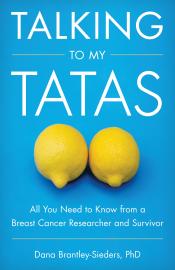
Talking to My Tatas: All You Need to Know from a Breast Cancer Researcher and Survivor by Dana Brantley-Sieders
With humor and empathy, Dana Brantley-Sieders explores the science and realities of breast cancer for the love of your boobs and your life.
Dana Brantley-Sieders spent twenty years working as a biomedical breast cancer researcher. Then, she was diagnosed with breast cancer. She thought she knew breast cancer before it whacked her upside her left boob and left her bleeding on the curb of uncertainty. Turns out, she had a lot to learn. This book shares Brantley-Sieders’ personal journey with breast cancer, from the laboratory bench to her own bedside, and provides accessible information about breast cancer biology for non-scientists.
Talking to My All You Need to Know from a Breast Cancer Researcher and Survivor, offers accurate, evidence-based science that is accessible to all readers, including the more than three hundred thousand individuals diagnosed with breast cancer every year, their caregivers, and their loved ones.
Knowledge is power, and lack of it can lead to overtreatment, unnecessary pain and suffering, and even death. By demystifying the process from mammograms, biopsies, pathology, and diagnostics, to surgical options, tumor genomic testing, and new treatment options, Brantley-Sieders aims to arm breast cancer patients with the tools they need to battle this disease with a healthy dose of humor, grace, and hope.
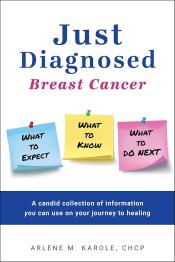
Just Diagnosed: Breast Cancer by Arlene M. Karole
Just Diagnosed, written by Arlene Karole is based on personal experience. Her book is dedicated to helping others become self-aware and empowered by taking charge of a breast cancer diagnosis.
Just Diagnosed started with scores of sticky notes as Arlene Karole began navigating the early stages of her diagnosis.
Voluminous research and numerous consultations with doctors and discussions with friends followed, ultimately leading to this book, designed to teach, inspire, and empower. No matter your unique diagnosis, stage of breast cancer, stage of life, or gender (men get breast cancer too!), you have choices regarding your attitude, approach, and healthcare decisions.
Karole uses incredible candor, an often humorous approach, and a great deal of vulnerability to speak to her readers. She provides resources, checklists, and definitions. This book is a road map, a step-by-step guide on what you can expect, what you need to know, and what to do next―from initial diagnosis through the difficult decisions ahead. In Just Diagnosed, Karole tackles this most intimate disease. You will face this news with great friends―even breast friends―courage, and fearlessness, knowing―you do have choices, you are in control and most of all, you are not alone.
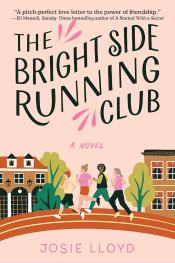
The Bright Side Running Club by Josie Lloyd
When Keira first receives her breast cancer diagnosis, she never expects to end up joining a running group with three women she’s only just met. Totally blind-sided, all she can think about is how she doesn’t want to tell her family or step back from work. Nor does she want to be part of a group of fellow cancer patients. Cancer is not her club.
And yet it’s running – hot, sweaty, lycra-clad running in the company of brilliant, funny women all going through treatment – that unexpectedly gives Keira the hope she so urgently needs. Because Keira will not be defined by the C-word. And now, with the Cancer Ladies’ Running Club cheering her on, she is going to reclaim everything: her family, her identity, and her life.
One step at a time.
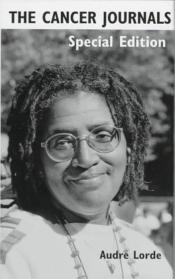
The Cancer Journals by Audre Lorde
Moving between journal entry, memoir, and exposition, Audre Lorde fuses the personal and political as she reflects on her experience coping with breast cancer and a radical mastectomy. Includes photos and tributes to Lorde written after her death in 1992.
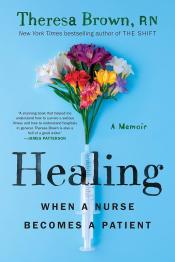
Healing: When a Nurse Becomes a Patient by Theresa Brown
Despite her training and years of experience as an oncology and hospice nurse, Brown finds it difficult to navigate the medical maze from the other side of the bed. Why is she so often left in the dark about procedures and treatments? Why is she expected to research her own best treatment options? Why is there so much red tape? At times she’s mad at herself for not speaking up and asking for what she needs but knows that being a “difficult” patient could mean she gets worse care.
Of the almost four million women in this country living with breast cancer, many have had, like Brown, a treatable form of the disease. Both unnerving and extremely relatable, her experience shows us how our for-profit healthcare industry “cures” us but at the same time leaves so many of us feeling alienated and uncared for. As she did so brilliantly in her New York Times bestseller, The Shift , Brown relays the unforgettable details of her daily life—the needles, the chemo drugs, the rubber gloves, the bureaucratic frustrations—but this time from her new perch as a patient, looking back at some of her own cases and considering what she didn’t know then about the warping effects of fear and the healing virtues of compassion. “People failed me when I was a patient and I failed patients when working as a nurse. I see that now,” she writes.
Healing is a must-read for all of us who have tried to find healing through our healthcare system.
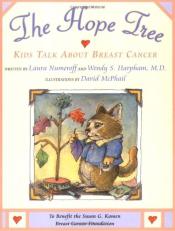
The Hope Tree: Kids Talk About Breast Cancer by Laura Joffe Numeroff
Taken from personal stories of children whose mothers have breast cancer, a touching collection shares their experiences, offers practical ways to deal with this illness, and is accompanied by adorable and reassuring illustrations.